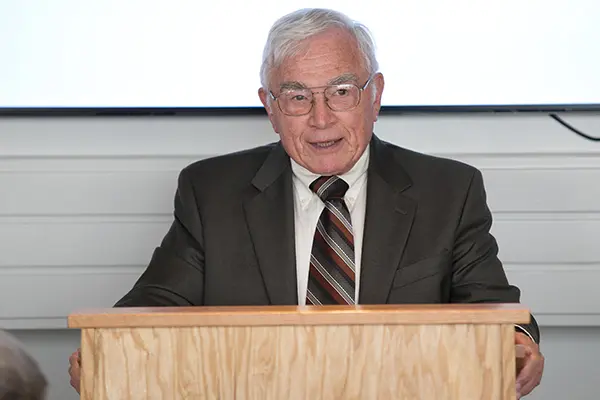Prof. Donald Leitch Lauded for Open-Door Policy, High Expectations
 Image by Rob Carlin
Image by Rob Carlin
06/06/2017
By Katharine Webster
Prof. Donald Leitch began teaching at the University of Colorado in 1956, with nothing more than an undergraduate degree in civil engineering.
The first day of classes, a skeptical Korean War veteran asked him, “How old are you?”
“Old enough to teach this class,” Leitch replied.
Several years later, as an assistant professor, he won an honorable mention in the humorous, student-run “Meanest Professor” competition as “Lucifer Leitch.” It was the first of many teaching awards.
After earning an advanced degree at Colorado and spending more time teaching, including a year at the University of Maine, Leitch joined Lowell Technological Institute in 1968. Here he taught the first cohort of undergraduates in the new civil and environmental engineering program, as well as state employees completing their college degrees in civil engineering technology.
Nearly a half-century, 3,000 students and two university name changes later, he has won 26 teaching and service awards, several of them more than once. Five years ago, the university’s student chapter of the American Society of Civil Engineers even created a new Donald G. Leitch Award – and named him the first recipient.
“The only reason that he does not win the UML Teaching Excellence Award every single year is because the contract does not permit a faculty member to receive the award two years in a row,” said Prof. Clifford Bruell, citing Leitch’s near-perfect scores on student evaluations.
The long list of honors culminated this spring with the Manning Prize for Excellence in Teaching, established two years ago by alumni Robert ’84 and Donna Manning ’85, ’91 to recognize a professor on each UMass campus who excels in teaching and service to students and the university. Leitch also has served two lengthy stints as department chairman and still advises all seniors.
Bruell, Prof. John Ting and others who supported Leitch’s nomination cited his clear teaching style, high expectations and open-door policy, especially for students who struggle academically.
“Don is the patron saint of troubled students and is full of creative solutions,” Bruell said. “He has worked constructively with students that most faculty members would give up on.”
“Don is old-school in his teaching method,” Ting wrote in a letter supporting the nomination. “He sets high, no-nonsense expectations for the students’ learning (as one would expect in a profession where incorrect design has life-or-death implications). But once students understand that he is entirely devoted and will go out of his way to help them learn and succeed, they genuinely appreciate him.”

“I don’t know if I’m a great teacher, but it’s my attitude toward the students,” he says. “It’s a matter of accepting students, whoever they are. I think I’m fair. My door has always been open, students know how I’m going to grade them – and I’m a preparation freak.”
That means preparing new lesson plans for every class, every year, instead of falling back on old teaching notes. It also means making sure that students understand how everything they’re learning relates to what they will do as professional engineers.
“If you don’t freshen up, you’re not as thorough,” he says. “Every year is different, and the students are different.”
Some of those former students include Lisa Brothers ’84, now chairwoman and CEO of her own civil engineering firm, who said Leitch advocated for her and helped her thrive as a first-generation college student and one of the few women majoring in engineering at the time.
“He cared about me and my future success. He often checked in on me and engaged me in conversations that not only made me feel welcomed, but also proved to be significantly positive and impactful in my life,” she said in a letter supporting his nomination.
Another former student, Mary McCormick, said that her freshman year, she struggled in Leitch’s class. But she could knock on his office door at any hour and he would say, “Pull up a chair.”
“Together, we would delve into a problem,” she said. “To this day, his class – the one that I once dreaded more than all others – is still my favorite class because it’s where I learned how to learn engineering.”
Students have fun with Leitch, whether he’s dressed up as “Exama Claus” at the department’s annual holiday party and reading “’Twas the night before finals,” or letting students break wood studs in the materials testing lab.

The first concrete canoe, a behemoth of 600-plus pounds, sank in the Kenduskeag Stream in Bangor, Maine, creating a new obstacle for paddlers in the conventional canoe race that followed. But the teams improved. In three of the past six years, the UMass Lowell team has advanced to the national championships, always accompanied by Leitch.
“Every time I meet a fellow alum from the civil and environmental engineering program, the first question I get after I tell them I work at UMass Lowell is, ‘Is Prof. Leitch still there? Is he still lifting 94-pound bags of cement in the Concrete Lab?’” said Edward Hajduk, a full-time lecturer and the ASCE chapter’s current adviser.
“He is an exceptional educator who blends practical applications, hard work and affection into a unique learning experience.”




